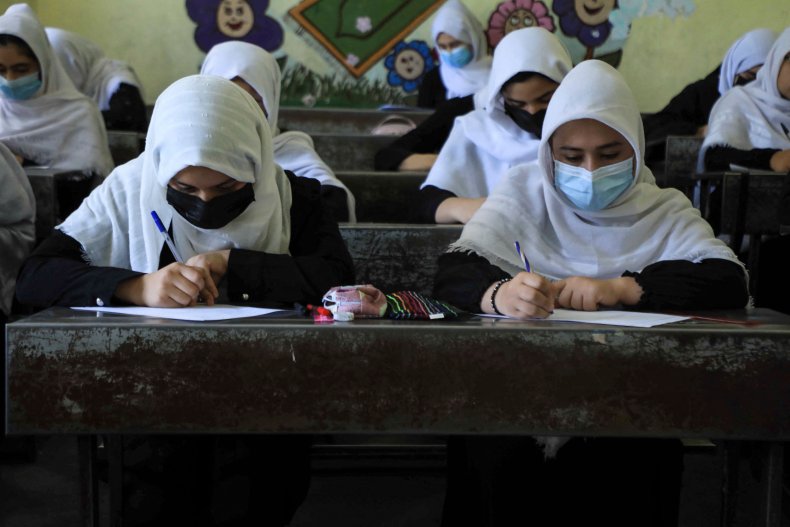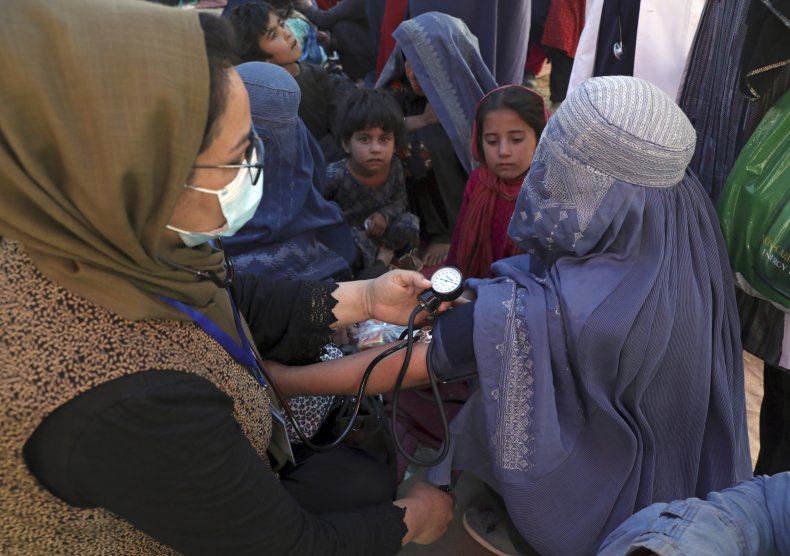Taliban Passes Out Hijabs, Long Scarves to Girls as They Return to School with Boys
Taliban fighters passed out hijabs and long scarves to girls in Herat, Afghanistan as they returned to school with boys after the Taliban's takeover of the country, the Associated Press reported.
Most of the city's residents, especially women, stayed inside their homes Tuesday, according to women's rights advocate Zahra, 26, who spoke to AP and requested her full name not be used.
The Taliban entered Herat five days earlier, before seizing Afghanistan's capital, Kabul, over the weekend. Zahra said children on Monday resumed exams at school, where young girls were met at the door by Taliban fighters, who requested they put on the scarves and hijabs.
Zahra hopes to leave the country by plane in the coming days. When she went to the market to buy items Tuesday, she said she received intimidating looks from some Taliban fighters as she wore a long dress and loose headscarf.
"We were the only females at the bazar," she said, adding that she was accompanied by her sister. "Almost all the shops were closed."
For more reporting from the Associated Press, see below.

Tuesday was the first time Zahra ventured out. Although they drew some stares, they did not receive any outright harassment.
In Kabul, a female news anchor interviewed a Taliban official in a TV studio—a sight once thought unimaginable.
Days after taking over the country following a lightning offensive, the Taliban made an effort to portray a more moderate stance, promising to respect women's rights and inviting them to join the government. Some Afghan women, deeply distrustful of the Islamic militants, sought to carefully test their limits.
But across much of the country, many remained home, too terrified to venture into a new world where an extremist group that once stoned women and restricted their every move is now in power. The group's charm offensive contradicted reports on the ground, including door-to-door visits by militants looking for journalists, people who worked for the opposition and other targets.
A Western female lecturer in Kabul, who wished to remain anonymous due to ongoing security threats, said fear grips the capital.
"They have been starting to go door to door, checking people's houses, sometimes forcing in. They are saying they are leaving the population alone, but that's an indication that this is not true," she said. AP was unable to independently verify the claims.
The Taliban has blamed scattered acts of looting and theft on criminals or people posing as the Taliban, not their fighters. The Taliban freed thousands of prisoners, including at the country's biggest prison, as part of a general amnesty.
The reports, if confirmed, would stand in stark contrast to the promises made by the group Tuesday.
Enamullah Samangani, a member of the Taliban's cultural commission, said the group was ready to "provide women with environment to work and study, and the presence of women in different [government] structures." Another official vowed to honor women's rights "according to Islamic law." The Taliban hold hardline interpretations of Islamic scripture.
"I do not believe the Taliban," said a senior female broadcaster in Kabul, who said she remained in hiding Tuesday at a relative's house.
She said she was too frightened to return home much less to work following reports the Taliban had a list of journalists and had knocked on some of their doors after entering Kabul on Sunday.
Her father told her to stay in hiding until the security situation becomes clearer. Speaking to AP by phone, the 29-year-old, who wished to remain anonymous for fear of retaliation, said the situation is unclear for women in Afghanistan.
Earlier, in a sign of the Taliban's efforts to portray a new image, a female television anchor on the private broadcaster Tolo interviewed a Taliban official on camera Tuesday in a studio.
"Unthinkable two decades ago when they were last in charge," tweeted Saad Mohseni, the station's owner.
In the western province of Herat, Zahra is known for her work with nonprofit organizations for the past five years.
When she went out to the market, most shops were closed. New stalls selling the Taliban's white flags emblazoned with an Islamic proclamation of faith had sprouted up.
So far there were no signs the group was forcing women to wear a burqa, the all-encompassing blue robe women were forced to wear under Taliban rule.
But these were early days, said Zahra, and she was certain the group had not changed at all.
For now, most women were waiting for clearer signs from the Taliban. In the meantime, they were preoccupied with immediate concerns such as whether they could go out on their own, whether they still had jobs or could ever pursue careers, or whether they should leave the country.
The senior TV broadcaster in Kabul said Afghan women have made great gains over the years, but she does not think the Taliban accepts those strides.
She said a friend of hers who is a presenter on Afghanistan's national broadcaster, Mili TV, called her crying after she was told Tuesday by the station to stay home and not return to work until further notice.
"I want to come back home, but my family—maybe, I don't know what I should do," she said.


